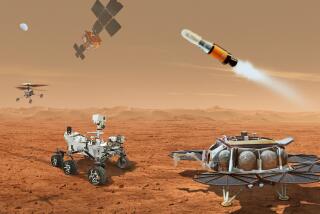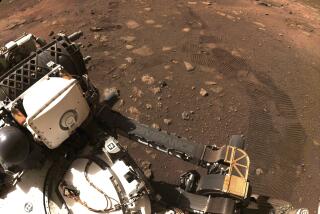Mars Is Nice to Visit, but Take a Look at Earth
- Share via
Now that the U.S. space shuttle has returned to service, there is increased excitement and talk about the new direction of the American space program.
Some would have us chart a course toward Mars in a manned mission with the Soviet Union. Others envision a manned space station as the logical progression in our exploration of space and its use for commercial purposes such as materials processing. Still other space enthusiasts identify moon-based research and exploration as the most feasible next phase of a rejuvenated American space effort.
While a good case can be made for each of these ambitious initiatives, there are compelling reasons to reserve at least a portion of the space agency’s budget for exploration of planet Earth.
A long-term program of Earth observation from space is necessary in order to obtain otherwise inaccessible data on global environmental changes that threaten the future habitability of the planet. These changes include, but are not limited to, the depletion of stratospheric ozone, the greenhouse effect, ocean pollution, deforestation and desertification.
An international program of space cooperation will be required to obtain the data necessary to develop models for predicting these changes and to devise strategies for coping with them. The coordination of U.S. and Soviet activities in the space-based study of global changes in the environment should constitute a major component of that international program.
The legal basis for coordination has already been created with the April, 1987, U.S.-Soviet agreement concerning cooperation in the exploration and use of outer space for peaceful purposes and the May, 1988, annex to that accord. Senior officials from 17 national space agencies have also endorsed the concept of “Mission to Planet Earth.” What is now needed in the United States is the political will and financial support to implement a cooperative program of space-based monitoring of global environmental changes.
A major rationale for the proposed U.S.-Soviet mission to Mars is the effect that it might have as an international confidence-building measure. An international program of space cooperation for the purpose of monitoring global environmental trends on Earth could have much the same effect and for a fraction of the cost. The beneficiaries of the cooperation, moreover, would not be limited to the superpowers; the environmental threats to Earth do not discriminate between developed and developing regions.
This symmetry in impact--something rarely present in world politics--makes the study of environmental problems an ideal subject for international cooperation. It also has the merit of demonstrating to nations often critical of the superpowers that they, too, may derive tangible benefits from advances in space science.
The proposed mission to planet Earth provides the Bush Administration with an opportunity simultaneously to showcase the rejuvenated American space program and to enhance international cooperation. Now is the time to creatively make use of space-based observations of environmental changes and, literally, to turn our attention from space to Earth.
More to Read
Sign up for Essential California
The most important California stories and recommendations in your inbox every morning.
You may occasionally receive promotional content from the Los Angeles Times.













